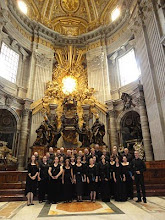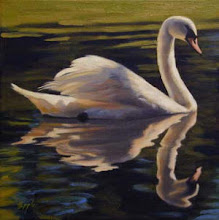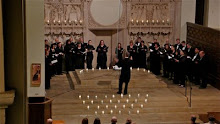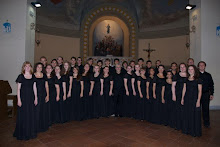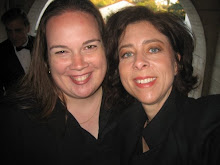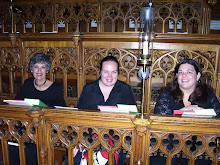November 12 was the UCSB voice department's first voice convocation of the year. I hate to admit how ill prepared I was. I was still memorizing my piece the night before. I sang Stella del Marinar form Ponchielli's La Gioconda. This aria marks a mental turning point for me towards thinking of myself as a dramatic soprano. Though, technically a mezzo-soprano role, it has more dramatic tendancies than my previous arias. The evening was set in Geiringer Hall and was a full house. I was pleased with my performance while recognizing areas that need improvement.

November 20th was the UCSB Chamber Choir concert. We performed parts of 2 Handel Oratorios. Belshazar and Solomon. In Belshazar I sung the role of Daniel and in Solomon I was Solomon. I still sung in the alto section of all chorus numbers as well. We had an orchestra accomany us which added extra rehearsals but made the end result well worth it. We performed in the larger space of the First Presbyterian church and I was worried if we'd be able to fill the space but was pleasantly surprised at our turnout. Perhaps it was due to the increase of UCSB music students, but we also had more faculty present than usual.

November 23rd was our department's production of opera scenes. I learned so much this quarter working with the world renowned opera director Ned Canty. (nedcanty.com) I was cast as the Principessa in Pucinni's Suor Angelica from his Il Trittico. I LOVE Puccini, you know I do and was super excited to sing this role. Our scene was close to 13 minutes and was so much fun. Of course the opera is not a comedy-the fun I refer to is the exquisite drama in Puccini's music. He writes in the music all movement and action. Every emotion and realization is clearly composed for you. And he does it all brilliantly. Annie sang the role of Suor Angelica and it was great to be able to sing this scene with her. The performance was sold out about 15 minutes before we were to start. It was a great audience. I am also extremely grateful to Alyssa who pointed out that I sang all of the Pricipessa role and can claim so on in my bio. Thanks Alyssa!

The first weekend in December I traditionally sing at Disneyland in their Candlelight performance. The DP alumni choir has to audition each year but this year marked my 18th year participating. The narator this year was Jon Voight. I was touched when he choked up in rehearsal but found it a little less convincing as it happened again after each performance and followed byt he same comment about how being an actor should mean he can control his tears. I think he proved he's an actor. He did great regardless and I thought this year was one of the best musically. It's so amazing to be part of such a large production with so many people watching.

This year the Quire of Voyces was invited to sing in Santa Barbara's First Thursday of the Month series at the Art Museum. Just imaging how great the accoustics were. We did selections from our Christmas concert.

It was announced this quarter that the Quire of Voyces will be touring this summer to... that's right, Italy! We are not just going to Italy but have been invited to sing High Mass in the VATICAN!!! I am so excited. We are also touring the Amalfi coast, including Naples, Capri, and Pompeii, and of course, Rome. La Cita Eterna!


Towards the beginning of the quarter I had seen a CAMA flyer announcing that Renee Flemming was returning to Santra Barbara and would be giving a concert at the Granada. I saw her 7 or so years ago at the Arlington and knew I didn't want to miss hearing America's reigning soprano again. She was amazing. Her concert was flawless and beautiful. Her first encore was O mio Babbino Caro by Puccini. I have played this song on the piano so many times that I can give you an Ab on command and recognized the opening chord immediately. (It made me smile that a few measures later, as the audience began to recognize the introduction, you could here their collective sigh.) Being my favorite aria it didn't take much else for Ms. Flemming to reduce me to tears. My heart constricted and I found myself holding my breath throughout the aria and into the silent moments that followed. She was signing cds and programs in the lobby afterward and we quickly joined the line to meet and greet the great. I had a case of starstruck and said something eloquent like "me want sing." She did seem pleased when I told her she has inspired me to hit the practice rooms.


The Quire of Voyces concert marked for me the close of the concert season. Both nights we sold out the beautiful, even while underconstruction, St. Anthony's Seminary. I have realized this Christmas season how grateful; I am to have a knowledge and familiarity with the lesser-known Christmas carol tunes. The beauty in their simplicity is a welcome change to the generic, soda-pop tunes that have been corrupted into over-arranged monstrocities. I love Christmas music but some of the arrangements heard in department stores and on the radio border on criminal. I can only pray that everyone has access to truly beautiful Christmas music. It is the best way to feel the Christmas spirit and keeps the focus of the season where it belongs. Alleluia!
Here's a link to one of the great reviews the Quire received.
http://www.noozhawk.com/arts/article/122109_margo_kline_quire_of_voyces_brings_mysteries_of_christmas>














